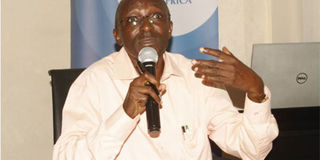Uganda Editors discuss regulation for the media

Dr Adolf Mbaine
The Uganda Editors’ Guild in partnership with the Media Focus on Africa (MFA), have started discussions on key issues in the media industry, including regulation and media freedoms.
At a recent dialogue held at Golden Tulip Hotel in Kampala, the editors discussed the kind of regulation the media needs to protect itself but also in order to gain respect.
Dr Adolf Mbaine, a lecturer from the Journalism School at Makerere University pointed out that the media needs to self-organise if the industry is to present a credible case for self-regulation.
While presenting a key note address under the topic “Creating Mechanisms towards Self-Regulation”, Dr Mbaine, presented the different options for regulation including -- statutory, self and co-regulation. He also expounded on the concept of self-regulation, a popular subject in the media industry circles in Uganda, pointing out its benefits and its dangers as well.
The dialogue, which was was supported by Konrad-Adenauer-Stiftung, also had a panel discussion and the panelists were Dr Mbaine; Mr Pius Mutekani Katunzi, the managing director of the Observer newspaper; Ms Barbara Among, a senior journalist and trainer; and Mr Daniel Kalinaki, the general manager, editorial at the Nation Media Group.
The panel agreed that while self-regulation is the ideal way to regulate the media in Uganda and to achieve more independence, the current context of issues and challenges facing the media in the country suggest that the industry may not be ready to regulate itself.
“Before we think of self-regulation, we need to be organised, defined and known. Journalism is the only profession in Uganda or one of those bodies that want to be a profession that is not defined, it’s so disorganised and in a way the state and other players have taken advantage of that,” Mr Katunzi said.
To that, Ms Among, said, “To propose self-regulation is putting the cart before the horse. In order for self-regulation to work we need three things, maturity, civility, and respect for colleagues and the general public…. Are we ready for it? No, not at the moment!” Ms Among suggested co-regulation as a better option to pursue.
Mr. Kalinaki, who is also the interim chairman of the Uganda Editor’s Guild said that the industry needs to find its own home grown solutions. “I agree generally that we are not ready for self-regulation but not that we are not ready to develop a self-regulation mechanism. This is probably one of the few times where you have editors sitting in a room to have a conversation about the industry, this in itself is revolutionary and commendable,” he said.
Mr Alex Atuhaire, the editorial director of online platform PML Daily, who moderated the event pointed out that while there is a consensus that it is not yet time for self-regulation, there is need for the media to be more organised to work closely in order to achieve its goals and protect its interests.
The Uganda Editors’ Guild, is expected to be officially launched by World Press Freedom Day on May 3, 2020.
The editors’ guild, partnered with the Media Focus on Africa to organise the dialogue as one of a series of activities building up to the Uganda Media Week that will take place later in the year.
According to Ms Jan Ajwang Programme Manager, Media Focus on Africa, The National Media Week seeks to bring different stakeholders, like the media, academia, civil society, and government representatives to a consensus about key challenges facing the media and to agree on realistic and practical solutions to address them.
Donnas Ojok- Programme Manager, Konrad Adenuer Stiftung (KAS), said KAS has been supporting various media initiatives in Uganda for many years, however, they have recently been focusing on non-traditional media like social media.
“We have often found that social media doesn’t exist independent of the mainstream and traditional media and find the need to continue supporting mainstream media,” he said.




